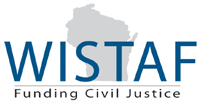Rebecca L. Murray, Executive Director, Wisconsin Trust Account Foundation, Inc.

Wisconsin has roughly one WisTAF-funded civil legal aid attorney for every 4,300 people in the state with incomes below 125% of the federal poverty level. In other words, if you filled Lambeau Field to its capacity, you’d have 18 lawyers to serve them all. What’s more, Lambeau Field’s seating capacity could accommodate only 10% of Wisconsinites who are income-eligible for the vast majority of WisTAF-funded legal aid.
Since its creation by the Wisconsin Supreme Court 36 years ago, WisTAF has administered the state’s Interest on Lawyers Trust Accounts (IOLTA) program, and has invested these and other critical sources of funds in civil legal aid programs statewide – more than $64 million, to date. Given the highly unstable nature of IOLTA income, which is tied to bank interest rates and trust account principal balances, diversification with other more stable sources of funding continues to be essential.
The table below summarizes Wisconsin’s primary ongoing sources of civil legal aid funding that are administered through WisTAF. This does not include federal funds administered by federal agencies.
|
Funding source |
Annual High |
Annual Current |
Trend |
Notes |
|
IOLTA (Interest on Lawyers Trust Accounts) |
$2,038,520 (2007) |
$666,469 (2021) |
↓ |
WisTAF’s original source of funding, IOLTA income, has been hit exceptionally hard by the pandemic. March 2022 net income was 67% lower than its corresponding pre-pandemic monthly income.
|
|
PILSF (Public Interest Legal Services Fund) |
$933,250 (2015) |
$910,100 (2021) |
↓ |
Under SCR 13.01(2m) and SCR 13.015(4), actively practicing attorneys and judges pay $50 annually into the Public Interest Legal Services Fund to support civil legal services for persons who cannot afford a lawyer. |
|
Pro hac vice fees |
$73,700 (2021) |
$73,700 (2021) |
↑ |
A portion of this fee is distributed to WisTAF per SCR 10.03(4)(b)2. We’ve seen modest increases in pro hac vice fee income the past two years.
|
|
Cy pres awards |
$685,888 (2021) |
$685,888 (2021) |
↑ |
2021 cy pres income was an anomaly due to a single settlement. However, the timing was opportune given the pandemic’s extreme and sustained negative impact on IOLTA income. The prior annual high was $118,627. |
|
Temporary Assistance for Needy Families (TANF) passed through DCF |
$500,000 (2015-16) |
|
= |
Wis. Stats. § 49.175(1)(j)14 provides for grants to WisTAF of $500,000 in federal TANF funds per fiscal year to fund grants restricted to the provision of legal services in civil matters related to domestic abuse, sexual abuse, or restraining orders or injunctions for individuals at risk under s. 813.123 |
Additionally, the following temporary, one-time funding allocations for civil legal aid have been received or are in the pipeline to be allocated.
| Funding source | Amount | Date Expended | Comment |
| Federal class action settlement with Bank of America | $5,940,576 | Dec. 2023 | One-time distribution of funds as part of the U.S. Dept. of Justice settlement with Bank of America related to the 2007-08 mortgage foreclosure crisis. Funds are restricted to the provision of community redevelopment and foreclosure prevention legal assistance. |
| American Rescue Plan Act – Homeowner Assistance Fund | $927,053 | Sept. 2025 | Funds restricted to legal services, targeted to households eligible to be served with funding from the HAF, in civil matters for the purpose of preventing homeowner mortgage delinquencies and defaults, foreclosures, and displacements of homeowners experiencing financial hardship after January 21, 2020. |
| American Rescue Plan Act – State and Local Fiscal Recovery Fund | $8,000,000 | July 2025 | Funds restricted to civil legal services for low-income individuals who need legal assistance to recover from the COVID-19 pandemic; and to collaboratively develop a web portal to connect low-income individuals and others with legal services, information, and resources. |
| Afghanistan Supplemental Appropriations Act (US DHS) | $749,000 | Sept. 2023 | Funds restricted to immigration-related legal assistance for Afghan refugees/specific Afghan populations in response to their emergency evacuation and resettlement. |
The addition of these new funds will prove critical in addressing civil legal services needs exacerbated by the COVID-19 pandemic’s economic impact. But their one-time, temporary nature will leave a void that can only be filled with a more sustainable investment in Wisconsin’s civil legal aid community.
